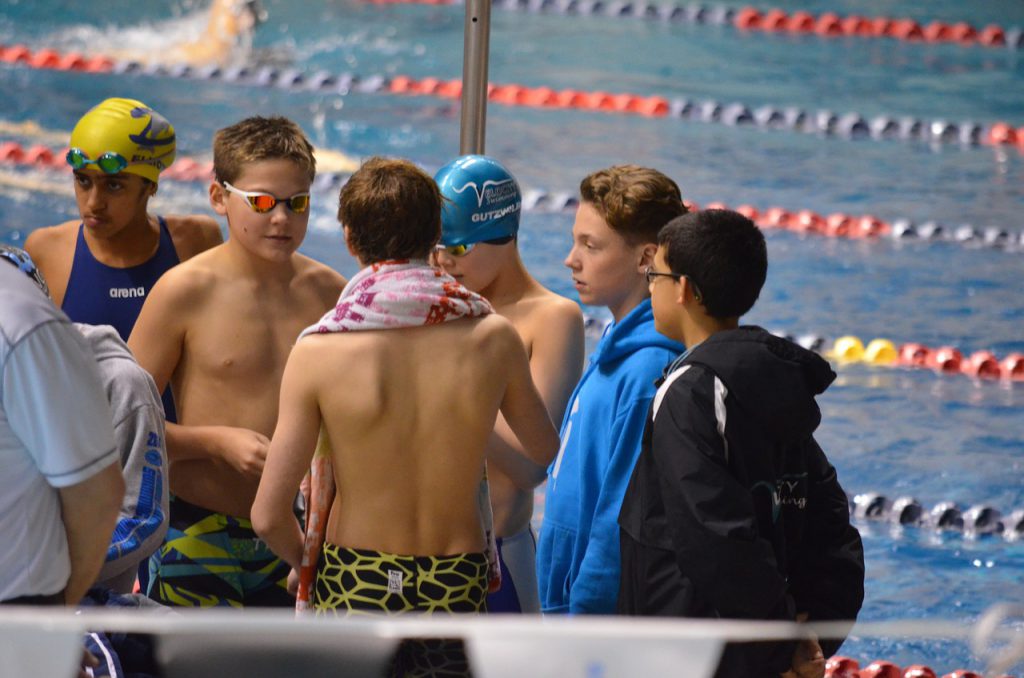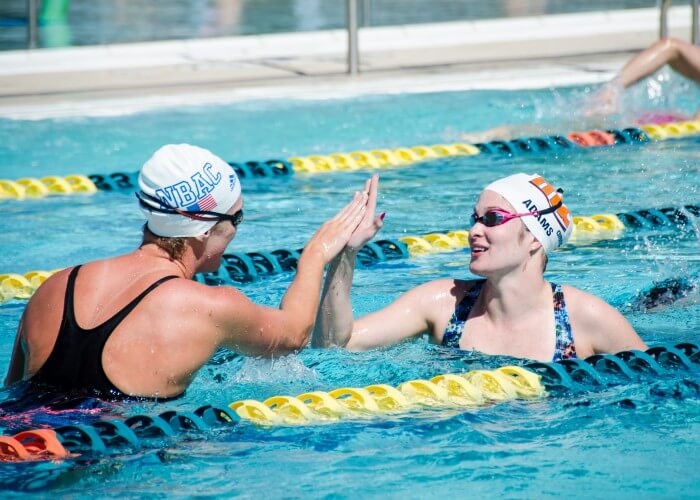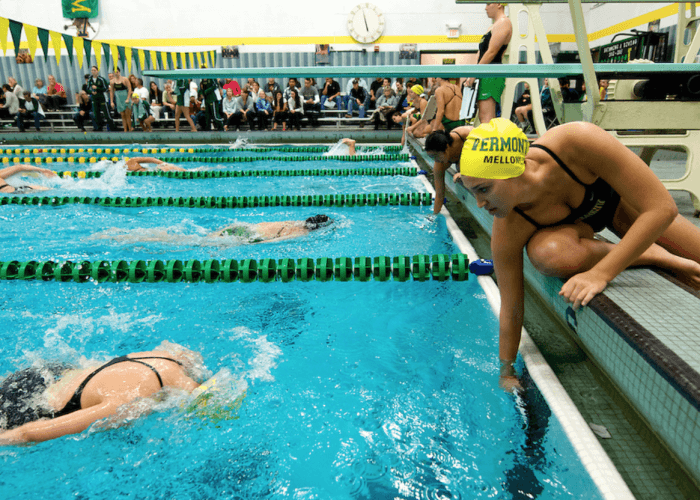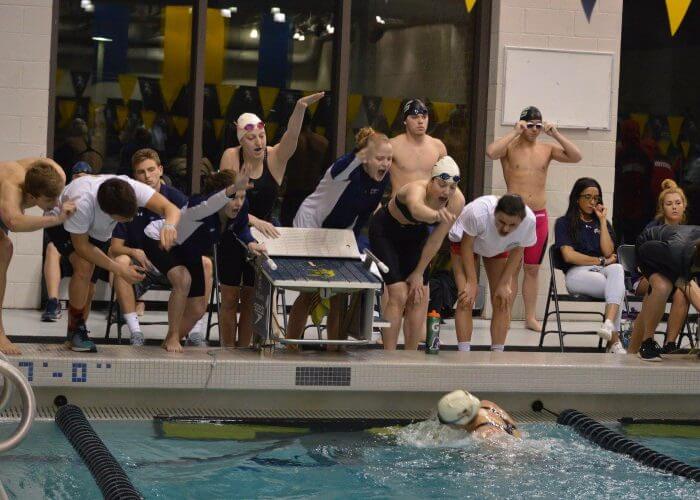Is Speed at the Core of Swimming?

By Claire Alongi, Swimming World College Intern.
The Myth of Speed
From the outside looking in, swimming is just a sport of speed. It’s how quick you can flip, take a breath and jump off the block. It’s the millisecond between the touches of first and second. It’s the pan of the camera because Katie Ledecky is so far ahead she’s not even in the same shot as everyone else. Yes, at the end of the day speed is a big part of swimming. It defines who you see on the podium and who goes home with the weight of a medal heavy around their neck. But speed is only one piece of the puzzle. When it comes down to it, to say swimming is just a sport of speed is doing everyone involved a great disservice.
“When I think of a good swimmer I think of someone who first and foremost is a good person,” said Brent Summers, head coach of Willamette University Swimming. This was a response mirrored by Willamette Swimming Assistant Coach Erin McVeigh. She said swimming was less about coming in with a certain speed or physicality as it was how you took a “mental standpoint on the sport and how willing you are to [suffer the suck] and like the suffer.” While both coaches did note that talent and speed were certainly desirable, it was not the first thing that they thought of when it came to describing a good swimmer.
The Give and Take

Photo Courtesy: Brooke Wright
Like most sports, the tricky part of swimming is that most people only see part of the picture – or more accurately, the final product. Only swimmers and coaches truly know the painful hours upon hours in and out of the pool that go into every race. What a lot of people might not realize is that even if you’re not that person surging into first place with the speed of a dolphin, there’s a lot you can offer to the sport and take away.
Sophomore Willamette swimmer Britt Shunn-Mitchell notes that she has gained a lot from the sport both mentally and emotionally. In high school, she went through several foot surgeries that made it difficult for her to walk. During this time, swimming was her rock: “ I think being able to swim definitely gave me a lot of confidence in myself and to be able to do a lot of things I would not have otherwise done. And it just helped me, on a deeper emotional level, gain a pretty positive spot during all of my surgeries,” she said. She went on to call the sport of swimming “dynamic” in that it impacts you on multiple levels. Even if you think there isn’t space for you on a swim team, there probably was, whether you were providing physical or social strengths.
Don’t Compare Yourself

Photo Courtesy: Brian Jenkins-UVM Athletics
“If you’re discouraged because you’re not fast, just know you have a spot on that team and you may get stronger with whatever you’re doing…. I just don’t think swim teams would work if everyone was just fast and that was it,” Shunn-Mitchell said.
McVeigh echoed this point when she said, “Don’t compare yourself to other people. The black line doesn’t talk back to you; you’re doing this sport because you love it. So you can’t compare yourself to other people. You’re competing against yourself. That’s how you need to look at it.” While not a new idea, the concept that you don’t need to be the next Phelps to succeed in the sport of swimming can be difficult for swimmers to wrap their head around. The intensity of the sport – from morning practices to grueling days of meets – can certainly force an all-or-nothing mentality. But that’s not how the best teams work.
Summers noted that, “If you remove ego and realize that each member of the team contributes, the team as a whole can improve.” It’s not called a swim “team” for no reason. Impacting team environment, whether you’re the hype man counting for someone’s 500 or helping a struggling teammate outside of the pool, all factor into how people perform.
Roller Coasters, Friendship, and a Lifelong Sport

Photo Courtesy: Samantha Schoenecker
Sophomore Willamette swimmer Elaine McQuillan also notes that swimming has brought her friendships and a “kind of community aspect.” Chuckling, she also added that “to be a swimmer, you kinda gotta be a little crazy, ’cause the sport is just going back and forth, back and forth, back and forth.”
McQuillan notes that perhaps more important than innate speed is perspective: “I think in the words of my father, ‘You’re not majoring in swimming.’ […] It’s my hobby. I get joy from it. Again, it’s a lifelong thing. I’m still gonna do Masters. Flash forward to me at 80 just like wiggling across the pool. I won’t be fast then either, but I’ll still be having fun, ya know?”
Both Summers and McVeigh have their own takes on their lifelong relationship with swimming. “This sport is a ride, that is for sure! It’s a roller coaster [where] you sometimes want to jump off at the top, and sometimes it’s a roller coaster you don’t want to get off of,” McVeigh said of her ongoing love/hate relationship with the sport.
Summers kept it simple. He said, “If it wasn’t for swimming, I’m sure I would not be the person I am today. I will forever be grateful for my time in the sport as a swimmer and all the challenges it presented me. It allowed me to grow and push myself to be better each day.”
–All commentaries are the opinion of the author and do not necessarily reflect the views of Swimming World Magazine nor its staff.




Adam McIntyre interesting read I think some of the age groupers might appreciate
No. It’s heart
This is a great read. Swimming offers so much whether or not you are one of the fastest members of the team!
Glad to see most of the grammar/word smithing has been corrected since this was first posted. Does the publication have editors?